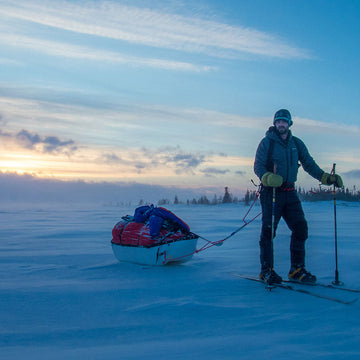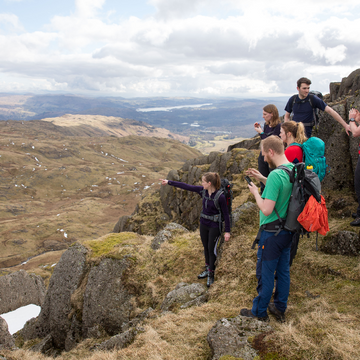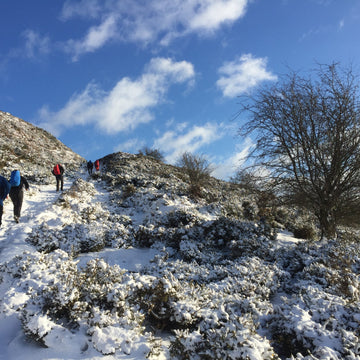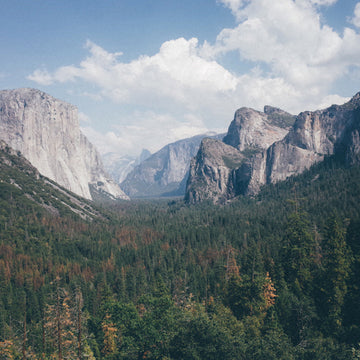
Exploring the fifth option, embracing unconventional paths with open minds and hearts.
When I wrote about ‘Planning the West Highland Way’ in the latest edition of Outpost magazine, I’d narrowed our logistics choices down to 4 options; B&Bs, a sherpa service for transporting camp kit from site to site, one of us driving to the end of each leg and running back to meet the other, or carrying everything on our backs. It was a comment below the article on the Alpkit website that got me thinking about a possible fifth option: fastpacking.
I’d heard of fastpacking but had written it off as a WHW option as I’d imagined it was simply running instead of walking with your backpack on. When I thought about how uncomfortable I found even a couple of hours of hiking with a heavy pack, the idea of attempting to break into a run was unthinkable.

Despite my misgivings, I started to do some research. What I discovered is that the pack itself plays a large part in making running (ok, maybe shuffling) rather than walking a possibility. Specific fastpacking bags are smaller and less rigid with more options to tighten from every angle to keep the pack fitted snugly against the body, therefore avoiding bounce.
The other major difference to the backpacking I was familiar with was adopting a much stricter approach to the packing list, stripping back your kit to what you really can’t live without. This quickly became an obsession and we soon had the digital scales out and were weighing everything. So out went the groundsheet and the coffee press (500g). One small bottle of shower gel between us would have to do for washing bodies/hair/clothes. Merino tops that don’t stink after 1 day would mean packing fewer clothes. This obviously has to be balanced by how much discomfort you are prepared to endure in order to make the running experience less taxing.

It did make me think that a successful fastpacking experience may require either high levels of hardiness e.g. skip the tent and sleep under a tarp (saving at least 1kg) or a bank account healthy enough to throw money at the problem (super-lightweight camping gear is readily available, but at a price). However, much weight saving can be made by simply thinking through what you could swap or do without.
So, it was time to put it all into practice. We loaded up our minimal kit, borrowed some hiking poles and packed 2 days-worth of kibble into the dog’s new panniers (he was going to have to pull his weight too!). Despite my original worries, when we came to the first section of downhill, we found we actually could run. By the time we’d reached our camp spot for the night, we’d done a fair bit of running, including a long, steep descent and I was feeling surprisingly ok. The poles were a huge help, making me move faster on the climbs and flats and providing balance over technical downhill sections not to mention taking some of the strain of the extra weight off my knees.
Despite an ‘interesting’ night which included the tent being blown off its pegs at 1am by a ferocious storm which also saw us bailing at 5am, I am quite sold on the fastpacking idea. Option 5 it is for the West Highland Way.

![Definition [Mens]](http://us.alpkit.com/cdn/shop/files/Definition-men-2_f4cd81d7-2627-4420-893e-8fbdc7829b97.jpg?v=1770923025&width=768)

![Definition [Womens]](http://us.alpkit.com/cdn/shop/files/Definition-women-3_de589540-a031-4401-bce8-e960b05aef55.jpg?v=1770923264&width=768)
![Balance [Mens]](http://us.alpkit.com/cdn/shop/files/balance-mens-2025-reef_de0585ce-4a37-4ea0-aa70-9bde21f75efb.jpg?v=1770925005&width=768)
![Balance [Mens]](http://us.alpkit.com/cdn/shop/files/Balance-mens-1_d2a265af-9860-4b4a-806e-2bf43ab5fa5f.jpg?v=1770925004&width=768)
![Balance [Womens]](http://us.alpkit.com/cdn/shop/files/balance-womens-2025-black_f47ed331-d3d3-414d-b50d-88f82f401382.jpg?v=1770925178&width=768)
![Balance [Womens]](http://us.alpkit.com/cdn/shop/files/Balance-womens-3_bedba298-ed30-45fb-99b0-9d9c024fd4ce.jpg?v=1770925178&width=768)
![Fortitude [Mens]](http://us.alpkit.com/cdn/shop/files/fortitude-mens-2025-alder.jpg?v=1770925240&width=768)

![Fortitude [Womens]](http://us.alpkit.com/cdn/shop/files/fortitude-womens-2025-alder_f390ab25-71bd-4a4d-aeae-29466cb97a78.jpg?v=1770925579&width=768)









![Gravitas [Mens]](http://us.alpkit.com/cdn/shop/files/mens-gravitas-2025-chilli_abf898a0-0d96-4976-97db-2add4f89176d.jpg?v=1770922673&width=768)
![Gravitas [Mens]](http://us.alpkit.com/cdn/shop/files/gravitas-location-1-RETOUCH_e10b0702-da7b-4e11-8119-56b814511a4c.jpg?v=1770922672&width=768)
![Gravitas [Womens]](http://us.alpkit.com/cdn/shop/files/womens-gravitas-reef_a88460fc-8be9-4a87-b465-bc2a8b29c507.jpg?v=1770922689&width=768)






















